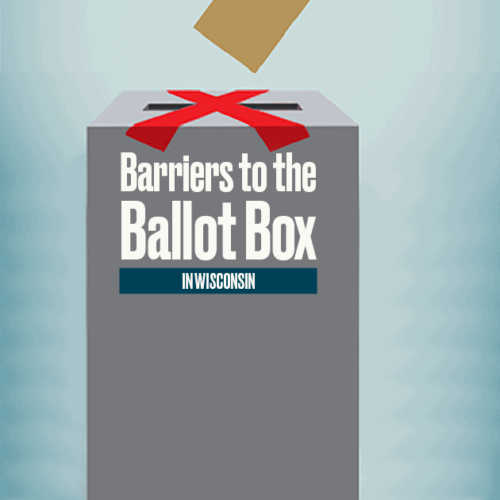Introduction
Voting in Wisconsin was, for many years, easier than many other states.
But in 2010, when Republicans swept into office on the Tea Party wave, lawmakers in the key swing state passed legislation that made it harder for people — especially people of color — to cast a ballot.
Sign up for The Moment newsletter
Our CEO Susan Smith Richardson guides you through conversations and context on race and inequality.
Wisconsin’s changes — along with a situation in which 14,000 absentee ballots went undelivered in the Wisconsin primaries earlier this year and President Donald Trump’s attempts to undermine mail-in voting — are all cause for alarm, said Molly Collins, advocacy director for the American Civil Liberties Union of Wisconsin.
“Wisconsin is very special in some ways,” Collins said. “I love it, but why can we not get this right?”
Here’s a look at some of the barriers to voting in the Badger State:
Photo ID
Wisconsin passed a law in 2011 that requires voters to present a valid photo ID when casting a ballot.
U.S. District Judge Lynn Adelman struck down the law, writing in 2014 that “it is absolutely clear that [the law] will prevent more legitimate votes from being cast than fraudulent votes.”
Adelman’s ruling was overturned by an appeals court panel. Despite continued legal challenges, the photo ID law was in effect for the presidential election in 2016.
Hillary Clinton and voting rights advocates argue the photo ID requirement led to Clinton’s stunning loss in Wisconsin in 2016. Republicans, however, say Clinton lost the state because she didn’t campaign there.
After the election, 11 percent of voters in Milwaukee County and Madison’s Dane County said they didn’t have an acceptable ID and couldn’t vote, according to a study by University of Wisconsin-Madison political scientist Kenneth Mayer. That means between 12,000 and 23,000 registered voters in Madison and Milwaukee — home to young college students and two-thirds of the state’s Black residents, respectively — were deterred from voting because of the law, which is still in effect.
Deadlines
Republicans in Wisconsin reduced the length of time voters could cast an early voting ballot from 30 days to 12 days after Scott Walker was elected governor in 2010. They also reduced early voting hours on nights and weekends while limiting available locations.
Lawmakers additionally extended from 10 days to 28 days the amount of time a resident must live at a new address before they’re allowed to register.
“If I moved in the last couple weeks and I want to vote, I can vote at my old place, but I’d have to go back and cast a ballot at my old polling location,” Collins said. “That’s not always possible. It makes it a little bit harder and you just pick a lot of people off the margins.”
A lower court struck down many of the state’s new election provisions after they were challenged by liberal groups, on the grounds that they disproportionately affected voters of color. But in June, an appeals court reversed the lower court’s decision, ruling that Republican lawmakers wrote them to help the GOP, not specifically to discriminate based on race.
Felony disenfranchisement
People who have been convicted of felonies in Wisconsin can’t vote while they’re in prison or on parole, but they automatically get their voting rights back once they’re no longer under supervision.
However, Wisconsin has one of the highest rates of parole supervision, and the length of time people who have been convicted of felonies remain on parole is nearly twice as long as the rest of the United States, according to researchers.
All of this contributes to Wisconsin’s continued disenfranchisement of voters who have been convicted of felonies, Collins said.
“Wisconsin is out of whack with many other states on that,” Collins said. “It’s not uncommon to have 10 to 15 years on parole or probation, and you’re disenfranchised for that whole time.”
In 2013, University of Wisconsin researchers found that the state’s 13 percent incarceration rate for Black men was nearly twice the country’s rate.
Read more in Money and Democracy
US Polling Places
Felony disenfranchisement is one of the only remaining barriers to voting in Washington
Automatic voter registration and same-day registration make it easier for residents to cast a ballot.
US Polling Places
In West Virginia, one barrier to voting removed, other stumbling blocks still in place
The state will allow anyone to vote by mail this year. But officials could do more, advocates say.


Join the conversation
Show Comments